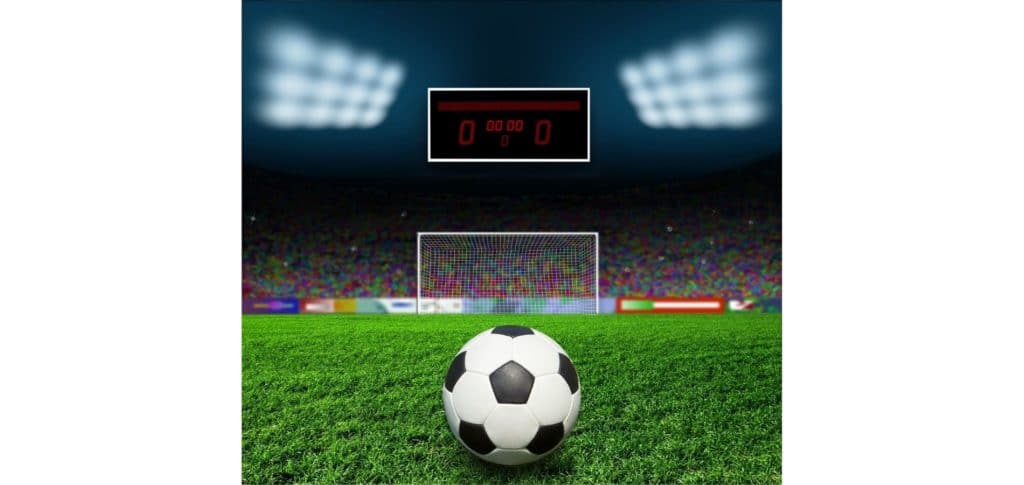It can easily be argued that there is nothing more satisfying in football than when the ball hits the back of the net.
A goal scored typically marks the culmination of a neatly crafted or efficient attacking move, and it’s often looked at as a symbol of success for the team that managed to engineer it.
Some competitive games can be very high scoring affairs, so it makes sense for those participating to have an easy way of recording the number of goal events that take place during a game.
Keeping score in soccer can be done through the hiring of a referee who maintains a written record of each goal scorer and their corresponding goal times. Alternatively, scores can be monitored through the use of an electronic scoreboard which is supervised by a dedicated scorekeeper who is present for the full duration of the match.
Now, before I expound on the aforementioned scorekeeping methods, I’d like to quickly clarify exactly how points are scored.
How do you score points in soccer?
In the history of the sport, there are only two situations where points are positively accrued:
- Goals scored
- Fixtures won
For the first scenario, the outcome of a match is decided by the final score line, with the latter itself determined by the amount of goals that each team manages to record during the period of play.
According to Law 10 of the International Football Association Board Laws of the Game, a goal is confirmed when the whole circumference of the ball crosses over the entirety of the goal line whilst being between the goal posts and under the cross bar.
The team with the highest amount of goals scored at the end of the match is always declared the winner.
When it comes to the second instance, points are awarded for fixtures that are won or drawn if the team responsible is involved in any sort of league format.
A total of three points for a win was initially proposed by Jimmy Hill in 1981, but it took more than a decade for this rule to be introduced to intercontinental competitions like the Champions League and World Cup qualifying.
In cases where no goals or an equal amount of them have been registered between both sides, then the match is declared as a draw, and both teams are each awarded with a single point for their efforts.
Methods for keeping track of soccer scores
Now that point tallying within the game has been demystified, I’ll carry on by detailing the three main ways that accurately keeping score can be attained.
1. Hiring a referee

Match officials do more than simply handling the disciplinary aspects of on-field play.
Referees are also supposed to keep a written note of the goals that are scored by players during a game, as such data points are necessary inclusions in their post-game reports which they usually submit to the relevant football authorities.
The information that gets put down on pen and paper includes:
- The team that scored
- The specific time that the goal event occurred
- The name of the goal scorer
Even more so, professional match referees also call upon their assistants (usually the fourth official) to keep their own written account of events that take place during the game.
This is so that they can compare their records as a way of verifying accuracy as well as spotting any match events that may have been overlooked by either official.
2. Getting a scorekeeper
Another alternative that is perhaps less of an expense when compared with hiring a referee is to source a scorekeeper.
This is an option that is ideally suited for the more casual pickup games or Sunday league level type matches that generally involve a bunch of friends who’ve come together for a kickabout.
The scorekeeper would be positioned metres away from the touchline and their role would simply comprise of taking a written note of the amount of goals that were scored by either side.
Conversely, they could make use of a flip scoreboard to record goal events in real time.
3. Utilising technology

Lastly, an electronic scoreboard can effectively do the job of keeping score in soccer.
These devices tend to come equipped with Light Emitting Diode (LED) displays for easy viewing and a wireless remote that allows a scorekeeper to input and adjust the scores manually.
Plenty of stadiums have these large scoreboard displays, and they are great for keeping the fans aware of the score line and alerting them to the amount of playing time which remains before each half concludes.
How many points is a goal worth?
All the previously mentioned scorekeeping methods rely on an individual monitoring when goals are scored during games.
For the correct input to be registered, a person must be aware of the numeric worth of a goal in the sport.
Without this basic knowledge, score tallying inaccuracies will arise and this could lead to disputes between both sets of teams.
So, it’s quite important to note that a goal is worth a single point in a game of soccer, regardless of the type of goal that has been scored.
Closing thoughts
With all that said, it’s time to wrap things up on today’s article.
There are quite a few approaches for keeping score in soccer, from hiring a professional referee who keeps a written record of goal events in a notebook, to using a dedicated scorekeeper who may choose to manually register goal tallies on their own or in tandem with an electronic scoreboard device.
Feel free to subscribe to my email list for even more content recommendations!
If you enjoy the content that I create and would like to buy me a coffee, then I’d really appreciate it!
Any money that I earn through this donation will be re-invested into more content for this website.
Additionally, by sending in a donation you’ll also receive a copy of my recently released 190+ page eBook on Soccer Ball Care, as well as be subscribed to our mailing list where you’ll be regularly informed on the latest developments concerning the Soccer Whizz blog.
- Future Icons: Europe’s Emerging Midfield Maestros Set for Glory - December 4, 2023
- Kickstarting a Revolution: How Soccer Transformed the United States Over the Last Four Years - October 7, 2023
- 4-1-4-1 Soccer Formation [Analysis] - September 23, 2023

